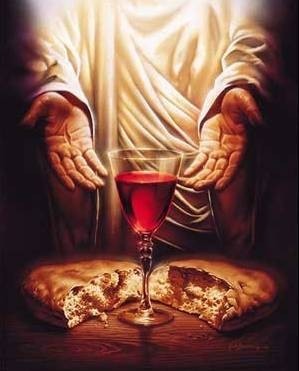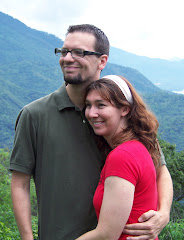In Chapter Six of
JWTSC (see immediately previous post), Rob Bell and Don Golden talk about the concept of Eucharist.

The word itself comes from the Greek word
eucharizomai, meaning thankful or thanksgiving. Literally the word means “to give what is good.” Thus, we can say that what we celebrate in the Eucharist (or the Lord’s Supper, or Communion, or whatever your tradition calls it) is God’s “good gift” to mankind, the gift of Jesus Christ. Through His sacrifice on the cross, God reconciles all of creation to Himself. Jesus’ body was broken and His blood was poured that you and I might reap the benefits of forgiveness and eternal life.
And this is the authors’ intent in talking about Eucharist. As they put it, “For someone to receive, someone has to give...If someone somewhere benefits, then someone somewhere has paid something.” (pg. 149)
Eucharist is about sacrifice. About a good gift that is given, but not without a price.
The Eucharist we celebrate is all about the body of Christ being broken, and the blood of Christ being poured out, for the sake of others. Thus, if we who would call ourselves Christians are truly the body of Christ, then a Christian ought to be “a living Eucharist, allowing her body to be broken and her blood poured out for the healing of the world.” (pg. 150)
That is our calling. That is life in the way of Jesus. Seeking to be broken and poured out for the sake of others. It’s why we still marvel at the lives of
Mother Teresa, and
Hudson Taylor, and
Jim Elliot, and
Brother Andrew. They were broken and poured out for God’s glory, and it cost them something. We marvel at these lives because there’s something in us that knows they are what life in Christ is supposed to be.
The problem is, we look at these heroes of the faith and subconsciously we say, “I’m no Mother Teresa. I'm glad she did what she did, but I could never do that, so I’m going to abandon this brokenness thing altogether.”
And that is where we miss the mark. The way of brokenness, the path of descent, is a journey. It is a counter-cultural lifestyle that must be learned and nurtured and mastered over time. It is a day-by-day yielding to the Holy Spirit by which we surrender more and more control over our lives to God, until we have eventually given Him everything. It is then that we will be living the Christian life as it was meant to be lived.
So where to begin this journey of brokenness? The authors raise a couple of questions that are of help here:
The Eucharist is what happens when the question is asked, What does it look like for us to be a Eucharist for these people, here and now?
What does it look like for us to break ourselves open and pour ourselves out for the healing of these people in this time in this place? (pg. 158)
Think about your neighborhood. Your city. Your workplace. Your family. What would it look like to break yourself open and pour yourself out for the healing of others in these places?
Maybe it’s buying some groceries for a neighbor who’s unemployed. Maybe it’s buying those groceries every week until he gets a job.
Maybe it’s having lunch with a coworker you never talk to. Maybe it’s having lunch with them every week until you can call yourself friends.
Maybe it’s giving away everything in your house that you don’t need. Which is probably most everything you own.
Maybe it’s donating your best clothes to Goodwill, instead of giving them your worn out and ill-fitting clothes like we usually do.
Maybe it’s realizing that you have an extra bedroom and offering it to someone who is struggling financially, or maybe just to someone you want to share life with.
Whatever it is, whatever you do, it should cost you something and benefit someone else. If you can do it and not feel the sacrifice of it, it’s not Eucharist. At least, not Eucharist in the way of Christ.
Believe me, living as a Eucharist is as big a challenge to me as it is to anybody. But isn’t it a challenge worth taking? These ideas inspire me, and spur me on to want deeper sacrifices and more selflessness in my own life. Surely, living broken and poured out for the sake of others is not an easy way to live. But it is surely the best way.
Lord Jesus, grant me the strength today to break myself open and pour myself out for someone else. Take my selfishness from me and give me the courage to lay down my life, that others might be healed. I desire to be a Eucharist, just as You are a Eucharist. In Your Name, and for the sake of Your Glory, I pray. Amen.


















